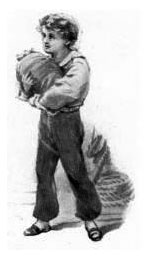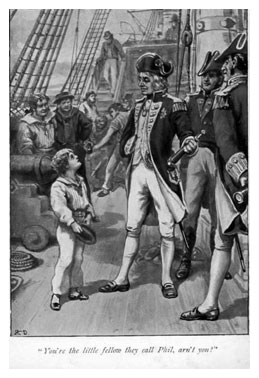Chapter 6 | The Powder Monkey
That mishap and the boy’s illness worked a complete change. His companions were not allowed to come to what was called the sick bay, but somehow they soon came to know that Phil had been appointed nurse, and that he was constant in his attendance, and doing everything he could to help the sufferer. Possibly they heard a good deal from Jack Jeens, who did manage to steal a few minutes with Phil once a day. So did the ship’s boys whenever Phil showed himself on deck. He tried to avoid them at first, but they cut him off, and to his surprise instead of plying him with blows they wanted to shake hands, while ever after they were the best of friends.
“Why is it?” Phil asked Jack Jeens, who laughed, and said he supposed it was because he tended the injured lad so well.
But Phil found that there was other work for him besides nursing a boy with a broken leg, for at certain times he was called up on deck when the men were working the guns, and he had to learn what was required from him in connection with the great gun to which Jack Jeens belonged, and in his quick way Phil soon did what was required, and that was, to run down to the magazine and fetch a flannel bag that seemed to be full of sand up on deck ready for the crew of the gun to push into the mouth of the gun, where it was rammed down with a long rod, before a big shot was taken out of the rack  close by, and rammed down the gun in turn, which was then fired.
close by, and rammed down the gun in turn, which was then fired.
It was all new to Phil, and he saw neither harm nor danger in it. It was nothing to him but going below to fetch that flannel bag, and he was in profound ignorance of the fact that if it went near a light he would be blown to pieces, while he could not have had a more dangerous task than that of the powder monkey who fetched up the charges from the magazine, where if a spark should fall the vessel would be blown to atoms and sunk.
Phil was not afraid, for he could not see the danger, and he laughed and liked to run up and down from the powder magazine to the main deck, because the big bluff men always laughed and said pleasant things to him. He was not afraid either on that day when Jack Jeens looked very serious and sponged his face for him over a bucket of water.
“Why, you’re as black as a sweep with the powder,” said Jack. “I say, didn’t you feel frightened when the guns roared?”
“No,” said Phil; “I only felt as if I should like to put my fingers in my ears. That gun did make a noise.”
Just at that moment a little serious-looking officer in uniform, with only one eye and one arm, stopped short, took off his cocked hat, and after putting it on again, laid the telescope he carried upon Phil’s shoulder.
“Why, you’re the little fellow they call Phil, arn’t you?” he said.
Phil nodded shortly.
“You’re the little powder monkey, they tell me.”
“Yes,” said Phil, looking at the little man wonderingly.

“And you’ve been bravely nursing the boy who broke his leg, eh?”
“Oh, it isn’t brave,” said Phil, laughing and showing his white teeth. “His leg hurts him very badly sometimes, and he likes me to read to him then and tell him stories.”
“Oh,” said the officer; “then you read to him and tell him stories?”
“Yes,” said Phil, “but I sha’n’t read half so well as I should like; but I am trying very hard.”
“To be sure,” said the little officer. “You are the sort of boy who would. And you can tell stories?”
“Yes, three—I mean four; and Tom Dodds likes to hear them all over and over again.”
“Bravo!” said the little officer, tapping Phil on the shoulder with the telescope. “There, be a good boy, and you’ll get on and be something better than a powder monkey one of these days.”
“Who’s that?” said Phil, as the little man walked forward and ascended the companion ladder. “I like him, Jack, almost as much as I do you.”
“And so you ought,” said Jack, gruffly, “for that’s our admiral, Lord Nelson, the greatest man in the world.”

